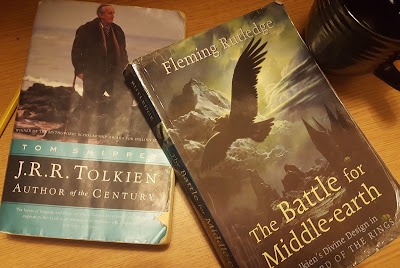Sunday, February 5, 2017
Understanding Tolkien: Conclusion
I hesitate to use the words 'Understanding Tolkien' and 'Conclusion' together in the same sentence, but the purpose of this short series wasn't to make any of us masters in Tolkien studies. Rather, my intention was to give a taste of how he communicated on important subjects using his skills as a writer. Hopefully this encourages you to study Tolkien in greater depth, with an eye to the richness that lays behind the printed words on the page.
At the end of the day, there are two vital lessons to learn from Tolkien as a writer. We must interact with the world around us, and we must read.While interacting with the world is a post for another time, here are some of the best books I've read on Tolkien which I think would benefit every writer whether they write fiction, fantasy, history, or essays.
By Tom Shippey
J.R.R Tolkien : Author of the Century, and The Road to Middle Earth: How J.R.R. Tolkien Created a New Mythology
Tom Shippey was one of Tolkien's successors at Leeds University, and at one point taught from the syllabus that Tolkien had constructed. What makes Shippey such an engaging read is his vast understanding of Tolkien's academic background as well as his wealth of historical knowledge. It is my humble opinion that no library is complete without a copy of these books, and any writer who has not read them is sadly missing out. Author of the Century focuses on Tolkien's impact in relation to the times in which he lived, and how it interacted with his professional studies, while The Road to Middle Earth is a closer look at how philology shaped Tolkien's world and how language inspired many of his best creations.
Shippey is one of the most knowledgeable writers I have read, for he possesses not only a deep understanding of philology and history, but also literary criticism both historic and modern coupled with a keen mastery of the writer's craft. I am currently reading through several more of his works at the moment and enjoying every one of them.
The Philosophy of Tolkien by Peter Kreeft
Peter Kreeft is one of those author who I will read no matter his subject, anything he writes is worth the time it takes to read, and this one is no exception. Kreeft is perhaps the one author on this list who's knowledge surpasses Shippey's, and even then only in Christianity and Catholicism, though one might say he remains near-peer in every other area. Kreeft is an exceedingly knowledgeable and readable (why can't those two traits coincide more often) author with a deep and vast mind. I highly recommend that you look more into his writings.
J.R.R. Tolkien: A Biography by Humphrey Carpenter
The definitive biography on Professor Tolkien, this short work is valuable because it focuses as much on Tolkien's mental life as it does on his physical one.Tolkien's early life contained much of the
"action", but it was the second half of his life that saw the many threads of his earlier years woven together.
The Battle for Middle-earth; Tolkien's Divine Design in The Lord of the Rings by Fleming Rutledge
The thing that I really enjoy about this book is the way it examines LOTR chronologically, exploring themes as they develop with the plot. Rutledge begins with the first chapter and works his way through the story, examining how Tolkien builds his message. I believe this is an important read, along with Philosophy of Tolkien, because as Christian authors, we need to understand what we are saying and communicating in what we write.
The Master of Middle Earth; The fiction of J.R.R. Tolkien by Paul Kocher
I almost didn't include this book, I've only read it once, and never owned it. However, Kocher's chapter on Aragorn fundamentally changed how I looked at LOTR and how I look at heroes. I've seen this one at a few libraries, and it is well worth your time. I didn't write an article on Aragorn for this series but he remains in my mind one of the most important characters in the story for understanding Tolkien's thoughts on leadership and service. The contrasts between Denethor and Theoden, Aragorn and Boromir, Aragorn and Eomer, Gandalf and Sauroman may be something I explore in the future.
I hope this series has given a few of you a slightly better picture of Tolkien's background, and how it allowed him to become such a great writer. I was asked recently why I chose Tolkien to focus on, there are so many other great authors. I believe Tolkien understood history the way few others did, I believe he understood the modern condition better than many of his peers, and I believe that his Christianity allowed him to understand and balance both of those in a way that his peers could not. He studied and lived deeply and richly and that is what contributed to his excellence as a writer. If we too wish to be excellent writers, we must do the same.
Subscribe to:
Post Comments (Atom)

No comments:
Post a Comment